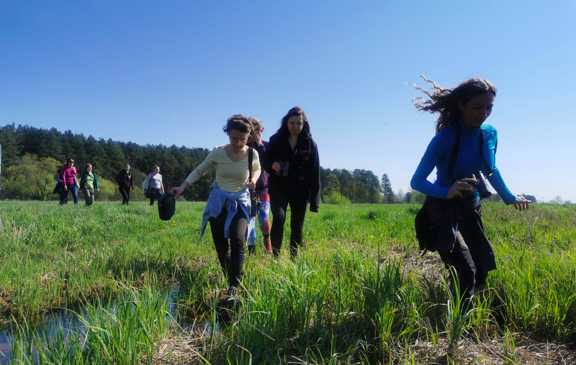We all know, that outdoor learning (OL) approach is an effective and beneficial method of education and self-development. The statement has been already proven by researchers, results, numbers. It’s certain that it increases engagement, there are of course physical health benefits, improves creativity and imagination, reduces stress, improves well-being, better attention and focusing on issues and can also provide equal opportunities for people from diverse backgrounds.
Basing on the Center for Innovative Education knowledge & experience of our main coach, we may say, that first of all, strength and effectiveness come from the nature itself: the environment increases our susceptibility to change, to discovering different things. The environment matters. While communing in the bosom of nature (that gives the authenticity of the place, kind of natural, neutral environment), we move more, we see greenery, we have more light – this has been proven scientifically. You may find very accessible scientific explanation of these mechanisms in Andrew Huberman’s podcasts about raising motivation – neuroscientist, associate professor of neurobiology at Stanford University School of Medicine.
While being outside, at the OL trip, cut off for a couple of days from technology and the routine of our habits and lives, we don’t have ready-made schemes, our self-remote control is off, that’s why our defense mechanisms that block changes are weaker allowing us to listen to ourselves. Then, we’re starting to accept inconvenient content, because there is no usual pattern (in our everyday life routine we go to our own toilet, we drink our favorite brand of coffee in our favorite cup and so on, and so on). In the forest, we’re redirecting attention in another direction, we have to “survive” without our everyday facilities. And that’s why the content given by mentors and coaches during outdoor learning training is better received by the participants.
A sine qua noncondition in every therapy or coaching is whether the motivation is serious: it doesn’t have to be strong, specific but it has to be. This is the basis. Is there a willingness, or is the motivation serious enough that you want to take advantage of it?
The trainers & coaches – their kind presence is a key factor. The person of the trainer gives you the opportunity, this is someone on your side, accompanies you in the change, does not judge. Authenticity also counts a lot – the trainer is a person who is credible. A trainer or coach is acting and working on the conditions of the participant. Outdoor learning is not a social rehabilitation camp. This is important.
Here are two stories of Zosia & Julia, OL participants. Zosia gives us the perspective of a person who is entering the adult life. Julia, in the moment of revolutionary changes in life & the return to the labor market, decided to take part in a trip.
Both came with fears and hopes. This hope did the job.
Zosia (22). Despite her young age, she works on many fronts, she intends to go to graduate studies, find a permanent job. She felt exhausted because problems were piling up. Going to the forest, cutting off, leaving the phone = leaving the problems, contact, it was very motivating for her. “The trip allowed me to breathe, gave me energy, gave me a broader view of things”. In the outdoor learning group they drew a lot from the fact that they became equal (despite the age difference). As if someone had pressed pause in life. Zosia thought about a lot of things, reviewed her decisions to see if they were right. And the trainers were great! At first, she wasn’t thrilled that there would be mentors, coaches. She even blamed herself for allowing herself to go on this trip. Thanks to her coach, she began to look at many things differently. Bare feet on a wet meadow at sunrise… She felt free again. “I must and I will suffocate”, “everything limits me” – it turned out that not at all! It’s not like someone is forcing us to do something. Only we put these nooses around our necks. She understood that nothing would happen if she lowers the bar.
“The hardened core inside me has been crushed in the long run – a few months have passed and the OL effect is working”.
Julia (42) is at the moment of dynamic changes in her life – private and professional. Basically a life revolution. She didn’t know what to do next – in her career. What would she like to do, what is she suitable for? She read a post about OL and the opportunity to take advantage of learning about strengths during such a trip. She had a strong motivation. Julia understood that not all questions had to be answered at once. That she can give herself time. She found her strengths and started training in this direction. There, in the forest, at last she was for herself and not for others. It has been a kind of reset and also great openness to other people. She was surprised by the fact that it depends on the participant what will happen, what you want to talk about, the topics and time of coaching are not imposed. She had to surrender to what was going on. She could afford to be yourself. Normally, we look for excuses not to give ourselves space for self-inspection and for not giving ourselves a chance for self-development – because this is also leaving the comfort zone. During OL there is no space for these excuses. That’s its effectiveness.
The FOLM project for NEETs, granted by Iceland, Lichtenstein, and Norway as a part of the EEA and Norway Grants Fund, resulted with success in 80% in general: 22% of participants came back to labor market, 49% went back to education, 9% afterwards were in training, travel or active job search.


